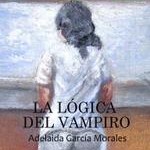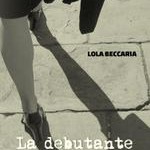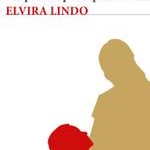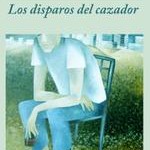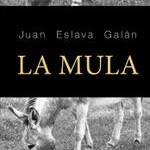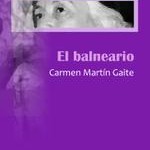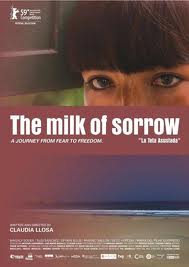El Instituto Cervantes NY en la ‘Book Expo America 2012′
Del 4 al 7 de junio en el Jacob K. Javits Convention Center de NY
 El Instituto Español de Comercio Exterior ICEX en colaboración con la Federación de Gremios de Editores de España FGEE, organiza el Pabellón Oficial de España, dentro del cual, un año más, nuestro Instituto Cervantes estará presente en esta importante feria neoyorquina del libro. La BEA es la primera feria en importancia del sector editorial en los Estados Unidos y la segunda a nivel mundial después de la de Frankfurt. En la BEA se dan cita cada año los profesionales más renombrados de la industria editorial internacional. Del martes 5 al jueves 7 de junio 30 destacados editores españoles presentarán al público especializado sus nuevos lanzamientos y tendencias.
El Instituto Español de Comercio Exterior ICEX en colaboración con la Federación de Gremios de Editores de España FGEE, organiza el Pabellón Oficial de España, dentro del cual, un año más, nuestro Instituto Cervantes estará presente en esta importante feria neoyorquina del libro. La BEA es la primera feria en importancia del sector editorial en los Estados Unidos y la segunda a nivel mundial después de la de Frankfurt. En la BEA se dan cita cada año los profesionales más renombrados de la industria editorial internacional. Del martes 5 al jueves 7 de junio 30 destacados editores españoles presentarán al público especializado sus nuevos lanzamientos y tendencias.
La feria se completa con interesantes conferencias y seminarios junto a otros numerosos e importantes eventos como charlas, coloquios y mesas redondas. A través de su stand el ICNY ofrece asimismo una completa información sobre las diversas actividades que realiza nuestra institución en la ciudad de Nueva York.
Las exportaciones de libros a los Estados Unidos alcanzaron los 12,6 millones de euros en el pasado año 2010.
European Book Club 2012 ‘Sepharad’ by Antonio Muñoz Molina
Spanish Session. Monday May 21st, 06:30 pm
Instituto Cervantes – ‘Jorge Luis Borges’ Library
Moderated by Antonio Muñoz Molina
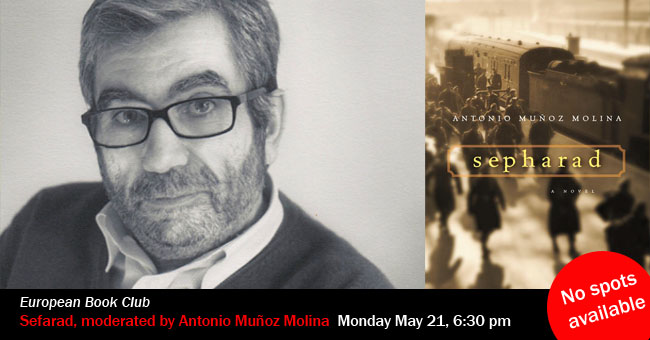 Sepharad (Spanish 2001) (English Harcourt, c2003) Transl. by Margaret Sayers Peden who received the PEN award / Book-of-the-Month Club Translation Prize in 2004-. In Sepharad Antonio Muñoz Molina tells 17 different stories about the Sephardic Diaspora, the Holocaust, and Stalin’s purges. With a mix of both fictional and historical figures, each of their stories concerns a life that can be undone by a decree from the state or religion. With connections and allusions that wrap back and forth between each story, Molina explores the concept of identity and how it can be created or erased by history, the persecution due to religion or ethnicity, the arrest without charges, families torn asunder by war and evil, and the lives shattered on a moment’s notice. Sepharad is a powerful and cautionary novel that has received strong reviews, from «a rich and complex story» (Milwaukee Journal-Sentinel) to «this tender and terrible book» (San Francisco Chronicle)
Sepharad (Spanish 2001) (English Harcourt, c2003) Transl. by Margaret Sayers Peden who received the PEN award / Book-of-the-Month Club Translation Prize in 2004-. In Sepharad Antonio Muñoz Molina tells 17 different stories about the Sephardic Diaspora, the Holocaust, and Stalin’s purges. With a mix of both fictional and historical figures, each of their stories concerns a life that can be undone by a decree from the state or religion. With connections and allusions that wrap back and forth between each story, Molina explores the concept of identity and how it can be created or erased by history, the persecution due to religion or ethnicity, the arrest without charges, families torn asunder by war and evil, and the lives shattered on a moment’s notice. Sepharad is a powerful and cautionary novel that has received strong reviews, from «a rich and complex story» (Milwaukee Journal-Sentinel) to «this tender and terrible book» (San Francisco Chronicle)
Reviews :
New York Times review by Michael Pye
San Francisco Chronicle review by Theodore Roszak
New York Times review by Richard Eder
Deseret Morning News review by Kason Swensen
Antonio Muñoz Molina (1956, Úbeda, in Jaén province) is one of the most celebrated Spanish authors. He studied art history at the University of Granada and journalism in Madrid. Both a Journalist and novelist his columns have regularly appeared in newspapers like ‘El País’ and ‘Die Welt’. He began writing in the 1980s and his first published book, El Robinsón urbano, a collection of his journalistic work, was published in 1984. His first novel Beatus ille (1986) (translated as A Manuscript of Ashes) features the imaginary city of ‘Mágina‘ — are-creation of his Andalusien birthplace — which would reappear in some his later works. Winner of prestigious awards: In 1987 the Spain’s National Narrative Prize for El invierno en Lisboa (translated as Winter in Lisbon), a homage to the genres of film noir; his El jinete polaco received the ‘Premio Planeta’ in 1991 and, again, the ‘Premio Nacional de Narrativa’ in 1992. Sepharad was the international breakthrough for the author. Margaret Sayers Peden’s English-language translation of Muñoz Molina’s novel Sepharad won the PEN/Book-of-the-Month Club Translation Prize in 2004. His other novels include Beltenebros (1989), Los misterios de Madrid (1992), En ausencia de Blanca (2001) (translated as In her absence), El dueño del secreto (1994), Las ventanas de Manhattan (2004), La noche de los tiempos (2009).
Since the 8th of June, 1995 Muñoz Molina is a full member of the ‘Royal Spanish Academy’. He was also director of our ‘Cervantes Institute’ in NY from 2004-2005. He now divides his time between Madrid and New York and is teaching at NYU
The author of Sepharad, Antonio Muñoz Molina, will moderate the session. More information about the European Book Club, visit http://europeanbookclub.org/
Club Europeo de Lectura 2012. Sesión española
Biblioteca ‘Jorge Luis Borges’ del Instituto Cervantes NY
Lunes 21 de mayo, 18:30 h
Sefarad: una novela de novelas, se publicó en español en 2001 y en inglés en 2003 en la editorial Harcourt. Traducido por Margaret Sayers Peden recibió en 2004 el premio de traducción PEN / Book-of-the-Month Club Translation Prizeen. En esta obra Antonio Muñoz Molina nos cuenta 17 historias diferentes sobre la diáspora sefardí, el holocausto y las purgas de Stalin. Combina hechos y datos tanto ficticios como históricos. Cada una de sus historias es una vida que puede ser destruida por un decreto gubernamental o una disposición religiosa. Las conexiones y alusiones se van tejiendo entre ellas a lo largo de cada historia. Muñoz Molina explora el concepto de identidad y de como esta identidad puede ser creada o eliminada por la historia, por la persecución o la reclusión, por el mero hecho de profesar una religión o de pertenecer a una comunidad étnica. Familias destrozadas por la guerra y el mal, vidas rotas en un instante. Sefarad es una novela potente y aleccionadora que ha tenido críticas contundentes como p. e. «una historia rica y compleja» (Milwaukee Journal-Sentinel) o «este libro sensible y terrible» (San Francisco Chronicle)
Antonio Muñoz Molina (1956 Úbeda, provincia de Jaén) es uno de los autores españoles más famosos. Estudió Historia del arte en la Universidad de Granada y Periodismo en Madrid. Periodista y novelista, sus columnas han aparecido con regularidad en El País y en el Die Welt. Comenzó a escribir en los años ‘80 y su primer libro publicado, El Robinsón urbano, una colección de su trabajo periodístico, fue publicado en 1984. Su primera novela en 1986 Beatus ille (traducido como A Manuscript of Ashes) presenta rasgos de la ciudad imaginaria de Mágina — una reconstrucción de su lugar de nacimiento en Andalucía — que reaparecerá en otros trabajos posteriores. Ha ganado importantes premios: En 1987 el ‘Premio Nacional de Literatura y Premio de la Crítica’ por Invierno en Lisboa (traducido como Winter in Lisbon), es un homenaje al género de cine negro; su El Jinete polaco recibió el ‘Premio Planeta’ en 1991 y, también, el ‘Premio Nacional de Narrativa’ en 1992. Sefarad fue su lanzamiento internacional como autor. La traducción al inglés por Margaret Sayers Peden obtuvo en 2004 el ‘PEN/Book-of-the-Month Club Translation Prize’. Otros títulos son Beltenebros (1989), Los misterios de Madrid (1992), El dueño del secreto (1994), En ausencia de Blanca (2000) (traducido como In her absence), Las ventanas de Manhattan (2004), La noche de los tiempos (2009). Desde el 8 de junio de 1995 Muñoz Molina es miembro de pleno derecho de la Real Academia Española. Fue también director de nuestro Instituto de Cervantes en NY 2004-2005. Últimamente tiene su domicilio en Madrid y Nueva York y da clases en la Universidad de Nueva York (NYU). http://antoniomuñozmolina.es/
El moderador de la sesión será el propio autor. Más información sobre el Club Europeo de Lectura en: http://europeanbookclub.org
ANTONIO MUÑOZ MOLINA en la BIBLIOTECA ‘JORGE LUIS BORGES’
OBRAS
- Las apariencias .- Madrid: Alfaguara, D.L. 1995. (Textos de escritor) ISBN 84-204-8172-6
- Ardor guerrero: Una memoria militar.- Madrid: Santillana, 1995.ISBN 84-204-8171-8
- Beatus ille.- Barcelona: Seix Barral, 1988
- Beltenebros.- 12ª ed.- Barcelona: Seix Barral, 1989. – (Biblioteca breve) ISBN 84-322-0600-8
- Beltenebros.- 23ª ed.- Barcelona: Seix Barral, 2004. (Seix Barral Biblioteca Breve) ISBN 84-322-0805-1
- Carlota Fainberg.- Madrid: Alfaguara, D.L. 1999. ISBN 84-204-4161-9
- Córdoba de los Omeyas.- Sevilla: Fundación José Manuel Lara, 2007.- (Ciudades andaluzas en la historia) ISBN 978-84-96824-04-1
- Destierro y destiempo de Max Aub: discurso leído el día 16 de junio de 1996, en su recepción pública,… y contestación de… Francisco Ayala / Muñoz Molina, Antonio; Ayala, Francisco.- Madrid: Real Academia Española, 1996
- Diario del Nautilus.- Madrid: Mondadori, 1989
- Días de diario / prólogo de Pere Gimferrer.- Barcelona: Seix Barral, 2007. (Únicos; 11) ISBN 978-84-322-4317-2
- La Disciplina de la imaginación.- Madrid: Asociación de Profesores de Español, 1991
- El dueño del secreto.- 3ª ed.- Madrid: Ollero & Ramos, 1993. (Novelas ejemplares) ISBN 84-7895-024-9
- En ausencia de Blanca.- Madrid: Alfaguara, 1999 ISBN 8420443409
- Escrito en un instante.- 1ª ed. en Calima Ediciones.- Palma de Mallorca: Calima Ediciones, 1997. CE. (Narrativa; 2) ISBN 84-920468-3-X
- El invierno en Lisboa.- [2ª ed.].- Barcelona: Seix Barral, 1987.Reimp. de la 1ª ed., 1987.ISBN 84-322-4593-3
- El jinete polaco.- Barcelona: Planeta, 1991.-(Autores Españoles e Hispanoamericanos)ISBN 84-320-7036-X
- Los Misterios de Madrid / Muñoz Molina, Antonio.- Barcelona: Seix Barral, 1992
- Nada del otro mundo.- Madrid: Espasa Calpe, 1993. – (Austral) Contiene: Nada del otro mundo ; El hombre sombra ; Las aguas del olvido ; La poseída ; Las otras vidas ; Extraños en la noche ; El cuarto del fantasma ; La colina de los sacrificios ; Si tú me dices ven ; Un amor imposible ; Borrador de una historia ; La gentileza de los desconocidos. ISBN 84-239-7674-2
- La noche de los tiempos.- Barcelona: Seix Barral, 2009-2010. – (Biblioteca Breve) 1ª ed.: 2009, 8ª reimp.: 2010.- ISBN 978-84-322-1275-8
- Las Otras vidas.- Madrid: Mondadori, D.L. 1988.- (Rectángulo; 7) Las otras vidas ; El cuarto del fantasma ; La colina de los sacrificios ; Te golpearé sin cólera ISBN 84-397-1457-2
- Plenilunio.- Madrid: Santillana, D.L. 1997. ISBN 84-204-8268-4
- Plenilunio.- 11a. edición.- Madrid: Suma de letras, 2004. (Punto de lectura) ISBN 84-95501-05-8
- La poseída.- Madrid: H Kliczkowski, 2005. ISBN 849630485X
- Pura alegría. 2º ed.- Madrid: Alfaguara, 1998. (Textos de escritor)- ISBN 84-204-8387-7
- El Robinson urbano.- Pamplona: Pamiela, 1988
- Sefarad: het boek der ballingen / uit het Spaans vertaald door Adri Boon en Erik Coenen.- Breda: De Geus, cop. 2003.Traducción de: Sefarad. ISBN 90-445-0183-6
- Sefarad: una novela de novelas.- Madrid: Santillana, 2001. ISBN 8466308482
- Sepharad /translated… Margaret Sayers Peden. – 1ªUS ed.- Orlando: Harcourt, 2003.- Versión en inglés dela novela Sefarad. ISBN 0-15-100901-5
- Ventanas de Manhattan.- Barcelona: Seix Barral, 2004.- (Biblioteca breve) ISBN 84-322-1178-8
- La vida por delante.- Madrid: Alfaguara, [2002] ISBN 84-204-6548-8
- El viento de la Luna.- 1ª ed.- Barcelona: Seix Barral, 2006. (Biblioteca breve) ISBN 84-322-1227-X
CRÍTICA
- CRUZ RUIZ, Juan: Egos revueltos: una memoria personal de la vida literaria.- Barcelona: Tusquets, 2010.- (Tiempo de memoria; 78) Contiene información sobre: […] Antonio Muñoz Molina [et al.] Obra galardonada con el XXII Premio Comillas de Historia, Biografía y Memorias ISBN 978-84-8383-221-9
- GAZARIAN-GAUTIER, Marie-Lise: Interviews with Spanish writers / Marie-Lise Gazarian Gautier. – 1st. ed. – Elmwood Park, IL.,: Dalkey Archive Press, 1991.Contiene entrevistas con: Antonio Muñoz Molina [et al.] ISBN 0-916583-72-4
- GONZÁLEZ ARCE, Teresa: El aprendizaje de la mirada: la experiencia hermenéutica en la obra de Antonio Muñoz Molina / Teresa González Arce.- Guadalajara: Universidad de Guadalajara, 2005. ISBN 9702707021
- MOLERO DE LA IGLESIA, Alicia. La autoficción en España […] Antonio Muñoz Molina [et al.]- Berlin: Peter Lang, 2000. ISBN 3906765296
- SIMPOSIO INTERNACIONAL SOBRE NARRATIVA HISPÁNICA CONTEMPORÁNEA 10º.2002. El Puerto de Santa María).- La ironía en la narrativa hispánica contemporánea X Simposio Internacional sobre Narrativa Hispánica Contemporánea : El Puerto de Santa María, noviembre 2002.- El Puerto de Santa María: Fundación Luis Goytisolo, D.L. 2003. Contiene: Conferencias: Reflejos irónicos en El dueño del secreto, de Antonio Muñoz Molina ISBN 84-89141-58-4
- SIMPOSIO INTERNACIONAL SOBRE NARRATIVA HISPÁNICA CONTEMPORÁNEA 11º.2003. El Puerto de Santa María): El personaje en la narrativa actual: [actas]: XI Simposio Internacional sobre Narrativa Hispánica Contemporánea.- [El Puerto de Santa María]: Fundación Luis Goytisolo, 2004. Contiene: Ponencias: La teoría literaria de Antonio Muñoz Molina a través de los personajes de En ausencia de Blanca / José Manuel Begines Hormigo ISBN 84-89141-69-X
- SIMPOSIO INTERNACIONAL SOBRE NARRATIVA HISPÁNICA CONTEMPORÁNEA 13º.2005. El Puerto de Santa María): Guerra y literatura: XIII Simposio Internacional sobre Narrativa Hispánica Contemporánea: [Actas] : El Puerto de Santa María, 9,10 y 11 de noviembre de 2005.- El Puerto de Santa María : Fundación Luis Goytisolo, 2006Bibliografía. Contiene: Comunicaciones: El tratamiento de la víctima en Plenilunio y Sefarad, de Antonio Muñoz Molina.- ISBN 84-611-3424-9
- SIMPOSIO INTERNACIONAL SOBRE NARRATIVA HISPÁNICA CONTEMPORÁNEA 14º.2005. El Puerto de Santa María): La resistencia de la novela: [actas]: XIV Simposio Internacional sobre Narrativa Hispánica Contemporánea: El Puerto de Santa María, 22, 23 y 24 de noviembre de 2006.- El Puerto de Santa María: Fundación Luis Goytisolo, 2007. Bibliografía. Contiene: Antonio Muñoz Molina: el compromiso con la calidad / José-Manuel Begines Hormigo ISBN 978-84-612-0458-8
MULTIMEDIA
- ANTONIO MUÑOZ MOLINA [Vídeo]: Entrevista / presentan Antonio Garrido y Raquel Chang Rodríguez.- Nueva York: Instituto Cervantes: CUNY TV, 2001.- (VHS/NTSC): color; 30 min.- (Charlando con Cervantes)
- El AUTOR y su obra: Presentación del libro Sefarad [Vídeo] / Instituto Cervantes.- New York: Hispanic Information and Telecommunications Network Inc., 2001.- (VHS/NTSC) : col. Nueva York, 7 de noviembre de 2001
- BARROSO NAVARRO, Jesús: Suite mágina: un poema sinfónica [Disco compacto] / .- Sevilla: CLASS, 2004.-1 Folleto (12 p.) ; min,. Incluye textos de Antonio Muñoz Molina y versos de Manuel Ruíz AmezcuaEl DUEÑO del secreto [Casete] / Antonio Muñoz Molina.- Madrid: Santillana, 1997.- 2 casetes (3 h.)- (Alfaguara – Audio) Leído por Joaquín Climent
- GARCÍA LORCA, Federico: [Disco compacto] / en la voz de Francisco Valladares; selección de Antonio Muñoz Molina.- Madrid: EMEC, 2010. (ca. 41 min.); 1 libreto contiene textos de los poemas.- (Poetas españoles; 4)
- LIBROS con voz: todos los autores y todas las voces de Alfaguara Audio [Audiocasete].- Madrid: Alfaguara, 1997.- 2 casetes ; 90 min. — (Alfaguara Audio) Contiene: Casete 1-Cara B: Antonio Muñoz Molina: El dueño del secreto (fragmento) [et al.]
- MACHADO, Antonio [Disco compacto] / en la voz de Francisco Valladares; selección de Antonio Muñoz Molina.- Madrid: EMEC, 2010. (ca. 41 min.) 1 libreto (contiene el texto de los poemas)- (Poetas españoles; 3)
- La MIRADA del escritor: Antonio Muñoz Molina [Vídeo] / Instituto Cervantes.- New York: Hispanic Information and Telecommunications Network Inc,2004. (VHS/NTSC): col; 40 min. (Encuentros Literarios) Nueva York, Mayo de 2004
- MIRÓ, Pilar: Beltenebros [Vídeo] / Miró, Pilar (dir.).- España: Iberoamericana de TV (Prod.), 1992. – VHS/PAL; 112′ : color. Intérpretes: Terence Stamp, Patsy Kensit, José Luis Gómez. Basada en:»Beltenebros» de Antonio Muñoz Molina
- NEW York en las literaturas hispánicas [Vídeo] / Delibes Chair. – New York: s.n., 2005.- (VHS/NTSC): col. Nueva York, 6 de mayo de 2005. Antonio Muñoz Molina (España; Director, Instituto Cervantes) [et al.]
- URIBE, Imanol: Plenilunio [DVD] .- Madrid: Sogepaq, 2001.- (PAL): color ; 112 min. Nacionalidad: España, 2000. Basada en la novela homónima de Antonio Muñoz Molina Subtitulada: Inglés, Español para sordos Intérpretes: Miguel Angel Solá, Adriana Ozores, Juan Diego Botto, Fernando Fernán Gómez, Charo López
- ZORRILLA, José Antonio: El invierno en Lisboa [DVD] .- Madrid: Suevia Films.-(PAL) : color ; 97 min. Nacionalidad: Francia/Portugal/España, 1991.Basada en la novela «El invierno en Lisboa» de Antonio Muñoz Molina. Intérpretes: Christian Vadim, Hélène de Saint-Père, Dizzy Gillespie, Eusebio Poncela, Fernando Guillén Cuervo , Michel B. Dupérial, Carlos Wallenstein
ANTOLOGÍAS, COLABORACIONES, CONFERENCIAS, EDICIONES, ENTREVISTAS, INTRODUCCIONES, PRÓLOGOS, PRESENTACIONES
- CARA y Cruz: iconografía de Max Aub / Presentación de José Luis Martínez y Antonio Muñoz Molina; [investigación, iconografía y selección de textos, Alba C. de Rojo].- Castellón: Fundación Max Aub, 2000.- ISBN 8495418029
- CARANQUE DE RÍOS, Andrés: Cinematógrafo / Introducción de Antonio Muñoz Molina.- 1ª ed. – Madrid: Viamonte, 1997. (Colección Reencuentros) ISBN 84-921422-3-5
- CHAVES NOGALES, Manuel: La defensa de Madrid / Manuel Chaves Nogales; edición de María Isabel Cintas Guillén; prólogo de Antonio Muñoz Molina.– Sevilla: Espuela de Plata, 2011.- (España en armas; 21) ISBN 9788415177319
- CONSTANTE, Mariano: Los años rojos: españoles en los campos nazis / prólogo de Antonio Muñoz Molina.- Barcelona: Círculo de Lectores, 2004. (La memoria del siglo) ISBN 84-672-0521-0
- ENCUENTROS [Publicación periódica] / Centro Cultural del BID.- Washington, D.C.: Banco Interamericano de Desarrollo, 1993- Contiene: Cervantes y el oficio de Contar / Antonio Muñoz Molina (moderador) [et al.]
- GARCÍA MONTERO, Luis.¿Por qué no es útil la literatura? / Antonio Muñoz Molina.- Madrid: Hiperión, D. L. 1993. – (Libros Hiperión; 150) Contiene: Las hogueras sin fuego / Antonio Muñoz Molina. ISBN 84-7517-389-6
- HISTORIAS de perdedores / Antonio Muñoz Molina… [et al.]; [selección, prólogo y notas de este volumen, Juan José Ordóñez Fernández].- Madrid: Editorial Popular, D.L. 1990. (Letra grande; 20).- ISBN 84-7884-011-7
- LINDO, Elvira: Manolito Gafotas / guión cinematográfico de Elvira Lindo y Miguel Albaladejo; [Antonio Muñoz Molina, pr.]. – Madrid: Ocho y Medio, 2003.- (Colección espiral 36) Ejemplar autografiado porla autora. ISBN 84-95839-45-8
- LÓPEZ, Ángeles: Martina, la rosa número trece / prólogo de Antonio Muñoz Molina.- Barcelona: Seix Barral, 2006. ISBN 84-322-9672-4
- MASIP, Paulino: El diario de Hamlet García / prólogo de Antonio Muñoz Molina.- Madrid: Consejería de Educación: Visor Libros, [2000] – (Letras madrileñas contemporáneas; 5) ISBN 84-7522-805-4
- MERMALL, Thomas: Semillas de gracia: memorias de amor, guerra y amistad / prólogo de Antonio Muñoz Molina.- Valencia: Pre-Textos, 2011. (Narrativa; 1139) Título original en inglés: Seeds of grace. A memoir. ISBN 978-84-15297-25-3
- MITRE, Eduardo: El paraguas de Manhattan / prólogo de Antonio Muñoz Molina.- Valencia: Editorial Pre-Textos, 2004. ISBN 848191598x
- «POCO a poco os hablaré de todo»: historia del exilio en Nueva York de la familia de los Ríos, Giner, Urruti : cartas, 1936-1953 / [idea original y selección de cartas y documentos] Ritama Muñoz-Rojas; prólogo de Antonio Muñoz Molina; epílogo de José García-Velasco.- Madrid: Publicaciones de la Residencia de Estudiantes, [2009]. ISBN 978-84-95078-66-7
- SON cuentos: antología del relato breve español: 1975-1993 /Fernando Valls. — 3ª ed. — Madrid : Espasa Calpe, 1994.- (Austral; 326) Contiene: La poseída / Antonio Muñoz Molina ISBN 84-239-7326-3
- TORRES, Rafael: El asesino de Sintra: y otros europeos olvidados / Rafael Torres; prólogo de Antonio Muñoz Molina.- Madrid: Calambur, 1996;– (Primera Estampa ; 9) ISBN 84-88015-22-4
Nuevos audiolibros para descargar / Audiobooks, new titles available for download
Disponemos de 10 nuevos títulos / 10 new titles available
‘Deseo ser Punk’
Belén Gopegui
‘La lógica del vampiro’
Adelaida García Morales
Lola Beccaria
Miguel de Cervantes
Elvira Lindo
‘Los disparos del cazador’
Rafael Chirbes
Eloy Tizón
Juan Eslava Galán
Andrés Barba
Carmen Martín Gaite
Entra en nuestro catálogo en línea y descárgatelos en tu PC o dispositivo móvil, sólo con dar tu número de carné de socio y la clave de contraseña. Puedes descargar cada título hasta 2 veces. Seguiremos ampliando con nuevos títulos este servicio de audiolibros-e y te mantendremos puntualmente informado. Cualquier pregunta no dudes en contactarnos: bib2ny@cervantes.org
Entra también en nuestro anterior post sobre audiolibros / Visit also our previous post about audiobooks
You can access it through our on line catalog using your library’s username and password. You will be able to download each audiobook to your PC or mobile a maximum of 2 times.
We will continue to add new titles to the audiobook service and, we will inform you periodically. If you have any further questions, please don’t hesitate to contact us: bib2ny@cervantes.org
‘Día Mundial del Libro y del Derecho de Autor’ / ‘World Book and Copyright Day’
Lunes, 23 de abril, en el Instituto Cervantes de Nueva York
Auditorio y Biblioteca ‘Jorge Luis Borges’
10:30 am – 5:30 pm
 Celebramos este gran día con las siguientes actividades
Celebramos este gran día con las siguientes actividades
Lectura del ‘Quijote’ por escolares neoyorquinos en 20 lenguas diferentes
Obsequio de un libro y una rosa a todos nuestros visitantes, usuarios y alumnos, según la vieja tradición catalana
Visitas guiadas a la Biblioteca ‘Jorge Luis Borges’ a todos los interesados
April 23th at Instituto Cervantes New York
- Reading of ‘Don Quixote’ in 20 different languages by schoolchildren
- Following the Catalan tradition, everyone who visits our center on this day will be presented with a book and a rose
- Guided tours through of the ‘Jorge Luis Borges’ Library
Breve introducción histórica / Brief historical summary
El 23 de abril el Instituto Cervantes acostumbra a organizar en la mayoría de sus centros esparcidos por el mundo diferentes actividades para la celebración del Día Internacional del Libro, entregando además rosas y libros a los visitantes que quieran acercarse a nosotros en esa fecha.
Every April 23rd the Instituto Cervantes organizes its many centers throughout the world for different activities in honor of World Book Day, traditionally celebrated by giving roses and books to people that visit us on that date.
Oficialmente en España el Día del Libro se celebró por primera vez el 7 de octubre de 1926 para conmemorar el fallecimiento de Cervantes. La idea original fue del escritor Vicent Clavel Andrés, proponiéndola a la Cámara Oficial del Libro de Barcelona. Poco después, en 1930, se instauró definitivamente la fecha del 23 de abril como Día del Libro por su coincidencia con la muerte de Cervantes y el nacimiento o muerte de otros ilustres escritores internacionales.
In Spain, Book Day was officially celebrated for the first time on October 7, 1926 to commemorate the death of Cervantes. The original idea was by the writer Vicent Clavel Andrés, who proposing it to the Book Chamber of Barcelona. Soon after, in 1930, the definitive date of April 23 was established as the Day of the Book by its coincidence with the death of Cervantes and the birth or death of other prominent international writers.
Tradicionalmente en Cataluña el Día de San Jorge (en catalán: Diada de Sant Jordi), 23 de abril, es el día de la rosa y del libro: el Día del santo Patrón, del amor y de la cultura, en el cual los enamorados se intercambian una rosa y un libro. Ahora ya no sólo entre las parejas, sino también entre amigos, colegas y familiares. Anteriormente las mujeres recibían una rosa y los hombres un libro. Desde hace ya décadas todo el mundo regala libro y rosa, indistintamente.
Traditionally in Catalonia, St George’s Day (in Catalan: Diada de Sant Jordi), on April 23, is the day of the rose and the book: the patron saint’s day of love and culture, in which people in love exchanged a rose and a book. Now the tradition is not only between couples, but also with friends and family. Previously women received a rose and men received a book, but for decades now everyone receives both a rose and a book
Se cree que la tradición de obsequiar en esta fecha con una rosa a la mujer amada se remonta probablemente al siglo XV. Algunas versiones hacen coincidir esta práctica con la Feria de las rosas o de los enamorados que tenía lugar en Barcelonadurante la primavera. Es en el siglo XVIII cuando se populariza el día como una fiesta de exaltación catalana y con el paso del tiempo se ha ido consolidado también como una jornada tradicional y festiva, extendida a toda España.
It is believed that the tradition of giving a rose on this date to the woman you love probably dates back to the fifteenth century. Some versions are matched with the Rose Fair for lovers that took place in Barcelona in spring. It is in the eighteenth century that this became popular as a feast day for the exaltation Catalan, and over time has been well established as a traditional and festive day throughout Spain.
Fue esa tradición uno de los argumentos utilizados por la UNESCO para declarar el 23 de abril Día Internacional del Libro, junto con el hecho de que grandes escritores de la literatura universal fallecieron o nacieron en esa fecha: Miguel de Cervantes, William Shakespeare, el Inca Garcilaso de la Vega y Josep Plà. En París, en 1995, la UNESCO instituyó, a instancias de la Generalitat de Catalunya y con propuesta presentada por la Unión Internacional de Editores, el día 23 de abril como el ‘Día Mundial del Libro y de los Derechos de Autor’, llamado también, en un principio, Día Internacional del Libro o Día del Libro.
That tradition was one of the reasons used by UNESCO to declare April 23 World Book Day, along with the fact that several great writers of world literature died or were born on this date: Miguel de Cervantes, William Shakespeare, Inca Garcilaso de la Vega andJosep Plà. In Paris in 1995, UNESCO established at the behest of the Generalitat de Catalunya and through a proposal submitted by the International Publishers Association, April 23 as ‘World Book and Copyright Day’, also called, World Book Day
Desde su creación se tomó en cuenta esta fecha, para la entrega anual del ‘Premio Cervantes’ equivalente al Premio Nacional de Literatura y el mayor galardón para los autores en lengua española.
Since its establishment this date has been taken into account for the annual bestowal of the ‘Premio Cervantes’ (Cervantes Prize), equivalent to the National Book Award and the highest award for authors in Spanish.
La teta asustada / The Milk of Sorrow
Proyección de cine / film screening
ICNY-Auditorio 28 de marzo 6:30 pm
Fausta padece de ‘teta asustada’, una enfermedad que se trasmite por la leche materna de las mujeres que fueron violadas o maltratadas durante la guerra del terrorismo en Perú. La guerra acabó, pero Fausta vive para recordarla porque la enfermedad le ha robado el alma. De repente, la muerte de su madre le obligará a enfrentarse a sus miedos y al secreto que oculta en su interior. La película – Claudia Llosa. Perú, 2009. 99 min. – fue seleccionada por Perú como candidata al Oscar 2010 en la categoría de película de habla no inglesa.
In Spanish with English subtitles
Fausta suffers from “The Milk of Sorrow”, an illness transmitted through mother’s milk by women who have been violated or mistreated during the war of terrorism in Peru. The war has ended, but Fausta lives to remind of it because “the illness of fear” stole her soul. Now, her mother’s sudden death forces her to confront her fears and the secret that is hidden inside of her. The movie – Claudia Llosa. Perú, 2009. 99 min. – was selected as the Peruvian entry for the Best Foreign Language Film at Academy Awards in 2010


